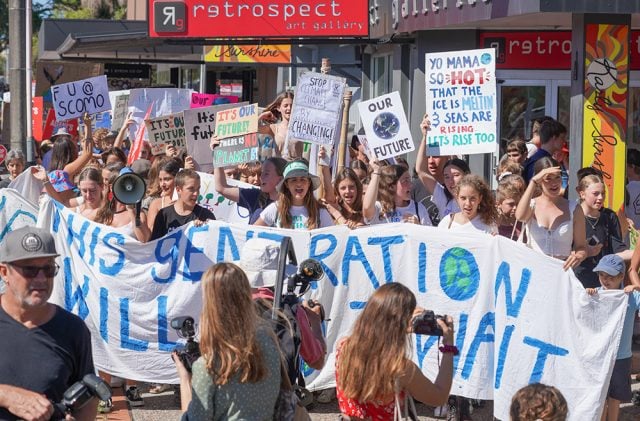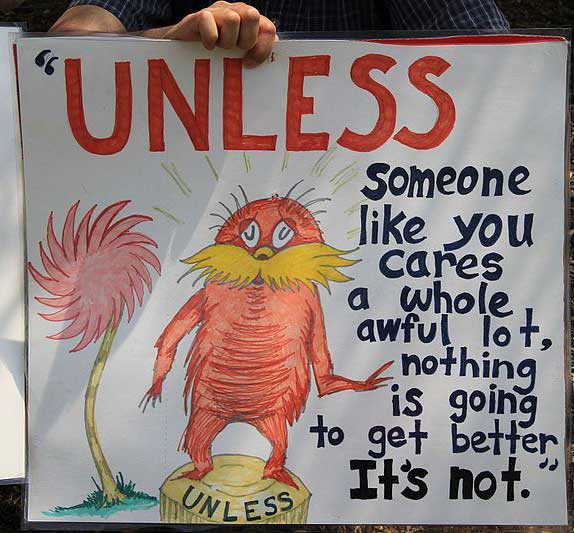
Jason van Tol
Last December the Education Council of the Council of Australian Governments (COAG) adopted a new educational policy – the Alice Springs Education Declaration. In this latest declaration, references to climate change and the inclusion of sustainability as a cross-curriculum priority were removed, and students were reconceived; no longer as citizens, but as apolitical ‘members of the community’. To understand the significance of this new policy it’s necessary to describe the history of its predecessors.

Youth confused, apathetic, and ignorant
In the late 1980s, with the effects of neoliberalism having begun shifting attention away from the politics, the Senate Standing Committee on Employment, Education and Training published the report Education for Active Citizenship in Australian Schools and Youth Organisations. It found that young people were confused, apathetic, and ignorant of political processes at both local and national levels. Similar findings were made by the Civics Expert Group, created by the government in 1994, which warned: ‘Our system of government relies for its efficacy and legitimacy on an informed citizenry; without active, knowledgeable citizens the forms of democratic representation remain empty; without vigilant, informed citizens there is no check on potential tyranny’.
Avoiding ‘potential tyranny’ and young people’s apathy toward everything political began three decades of education for active and informed citizenship – beginning with the Hobart Declaration on Schooling (1989). That was the first time that a national framework for schooling was set in Australia. It included ten Agreed National Goals for Schooling, one of which was ‘To develop knowledge, skills, attitudes and values which will enable students to participate as active and informed citizens in our democratic Australian society’.
This was followed in 1999 by The Adelaide Declaration on National Goals for Schooling in the Twenty-first Century, which continued the promotion of active and informed citizenship, stating in one of its goals that ‘When students leave school they should… be active and informed citizens with an understanding and appreciation of Australia’s system of government and civic life.’ As a separate goal, the Adelaide Declaration also stated that students should ‘have an understanding of, and concern for, stewardship of the natural environment, and the knowledge and skills to contribute to ecologically sustainable development’.
The following policy, the Melbourne Declaration on Educational Goals for Young Australians (2008), took on, in its own words; ‘a broader frame’, to account for ‘major changes in the world that are placing new demands on Australian education.’ It went on to list some of these, one of which was ‘complex environmental, social and economic pressures such as climate change’. To help address these, it mandated that sustainability would be a cross-curriculum priority. It also pared back its goals to just two broad ones, the second of which was that, ‘All young Australians become successful learners, confident and creative individuals, and active and informed citizens’. It detailed what active and informed citizens do, by stating that they ‘work for the common good, in particular sustaining and improving natural and social environments’.
Thus, over time, educational policy informing citizenship and sustainability had converged; first by mentioning them as parallel, but separate, goals and then by treating them as coincident ones. What it meant to be a good Australian citizen was to be active and informed and to ‘work for the common good, in particular sustaining and improving natural and social environments’. Nowadays there aren’t many issues bigger than climate change, so if you were a student who understood the basics and were participating in the recent climate strikes, you would have been contributing to the fulfilment of Australia’s educational policy goals.

Climate change removed
The new Alice Springs Education Declaration has some gaping omissions. It has two broad goals which are virtually identical to those of the Melbourne Declaration, except that now students are to become ‘active and informed members of the community’, rather than the decades-long goal of ‘active and informed citizens.’ Also, any reference to climate change has been removed: the new policy refers to ‘complex environmental, social and economic challenges.’ Fullstop. And finally, there is no longer a commitment to including sustainability as a cross-curriculum priority.
All nine state, territory, and federal Education Ministers were asked why these changes were made. Only the ACT minister has replied. Responding on behalf of Yvette Berry, Minister for Education and Early Childhood Development, Megan Cursley stated, ‘The revised declaration expands upon the scope of active and informed citizenship to include and recognise the value and diversity of the local and broader community.’ But this is specious reasoning. Within the context of modern nation-states citizenship is as expansive as communities get. Cursley also wrote that ‘The ACT Governments [sic] commitment to action on climate change, and educating future generations about sustainability and climate change, is independent to the national declaration.’
However, given that the COAG decision-making process is based on consensus, not majority, this is false, and avoids the question of why Berry agreed to remove reference to climate change and to exclude sustainability as a cross-curriculum priority.
When the Education Council of COAG was contacted with the same questions, no answers could be given, but it was suggested that the omission of reference to climate change may have been moved by one particular member of the council. We can speculate as to which one.

Perhaps the problem is that the recent student climate strikes were beginning to fulfil Australia’s educational policy in a way that no longer served parliamentary authorities. Perhaps it’s no longer that ‘[o]ur system of government relies for its efficacy and legitimacy on an informed citizenry,’ but instead relies on an ignorant, apolitical one. It seems that ‘without active, knowledgeable citizens the forms of democratic representation remain empty’ – which is what our elected ‘mentors’ apparently prefer – and that ‘without vigilant, informed citizens there is no check on potential tyranny’.
Indeed, potential tyranny is seen to be giving way to actual tyranny; for instance, by sending the AFP to raid the ABC, to create an atmosphere of fear and journalistic self-censorship. Whatever the reasons for Australia’s new education policy, it looks like students will have their work cut out for them.




Confusion reigns when it comes to the confused state we are in.
In December last year, COAG or just to confuse people further, The Education Council of the Council of Australian Governments because there is only one government, the other governments are minor state governments, well COAG who represents those minor state governments without any representation of the Australian people adopted a new education policy – the Alice Springs Education Declaration, when the Northern Territory is only a Territory and not a state or even a state government.
In their declaration COAG, in their so-called wisdom against the people of Australia as we live in a democracy, they cut out any references to climate change, and sustainability as a cross-curriculum priority. At the same time they declared that students were no longer students but were now members of the community.
LEN H: “other governments are minor state governments”.
Really? The Commonwealth doesn’t exist except as a federation of the states. No states, no Commonwealth.